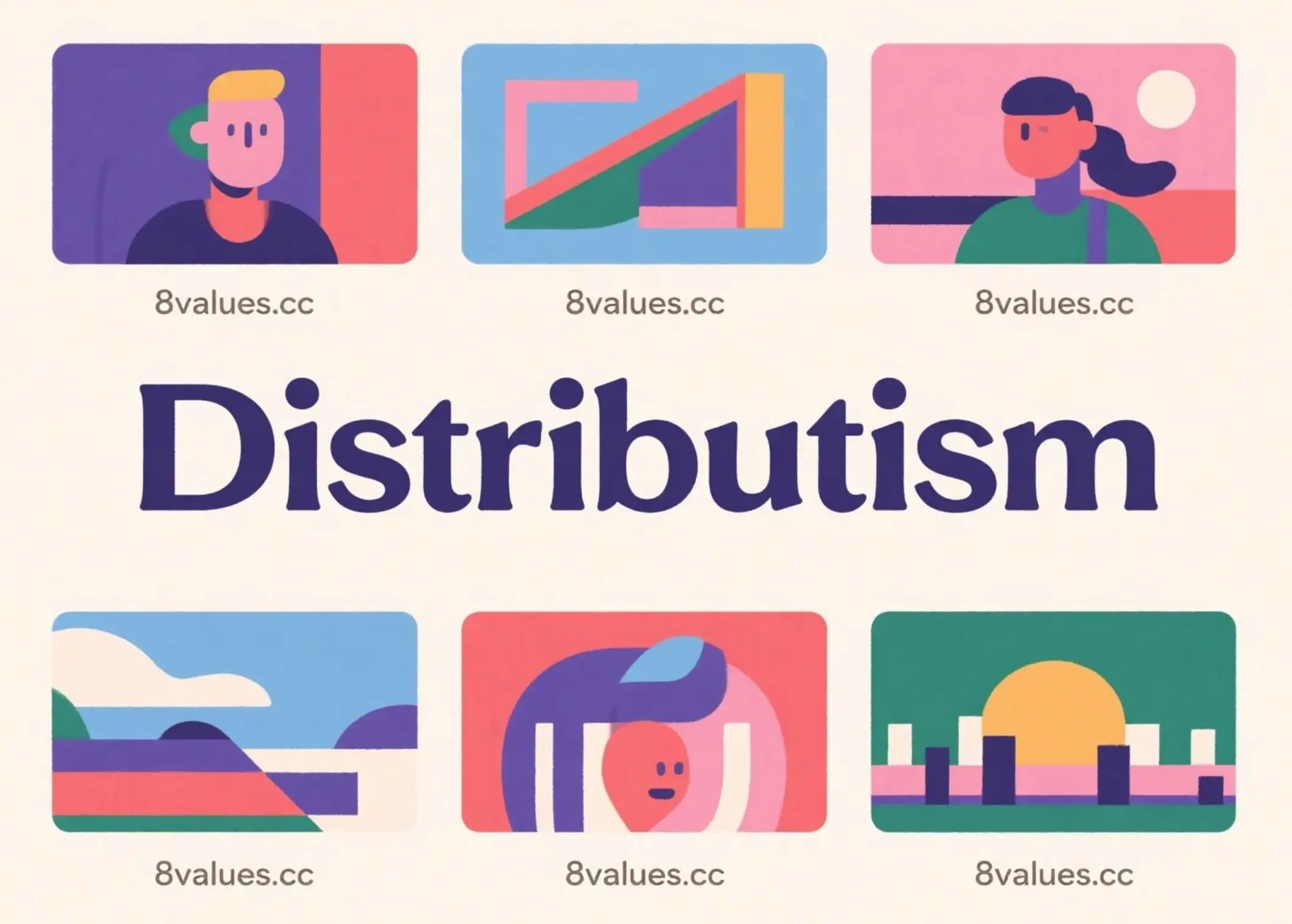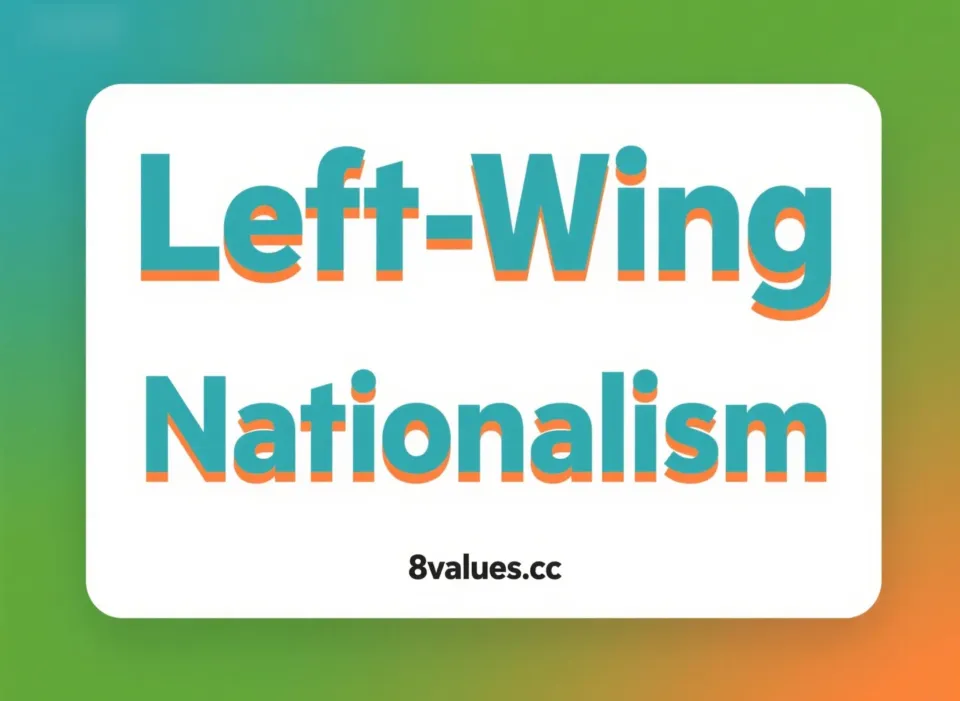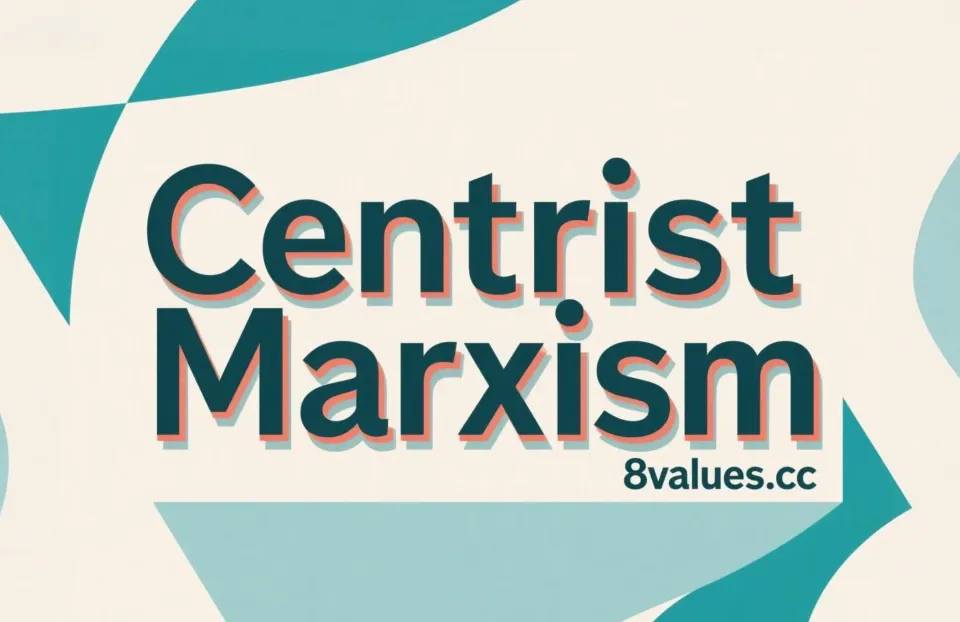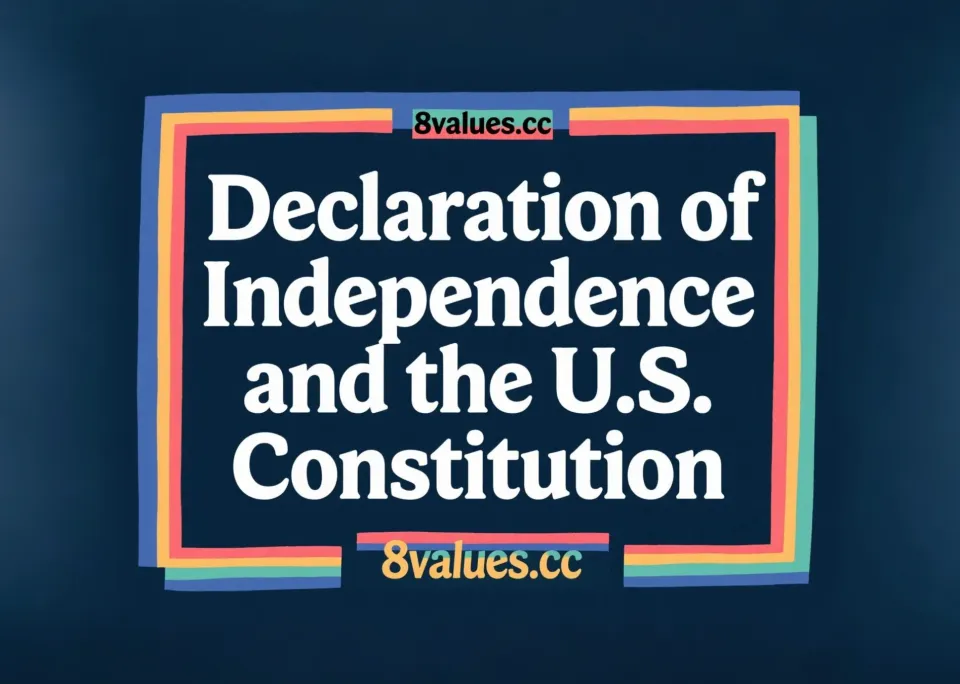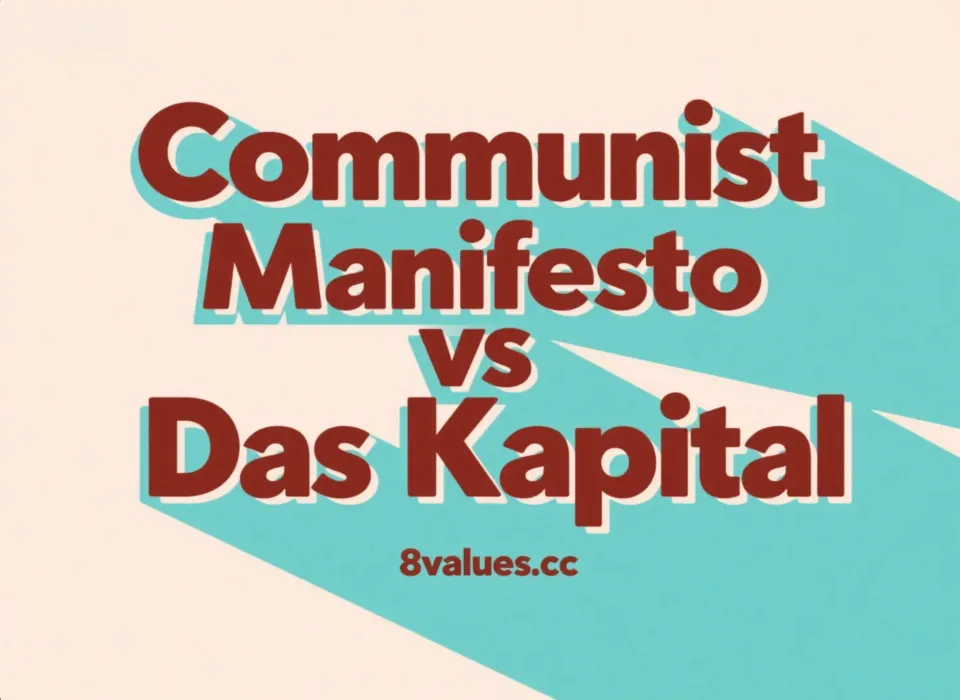Distributism | 8values Interpretation of ideological ideology of political test
This article deeply interprets the ideology of proletarianism in the 8Values political test results, including its historical origins, core principles, comparison with capitalism and socialism, real application, lifestyle, limitations and criticism, and helps readers fully understand the concept of proletarianism.
What is proletarianism?
Distributism, as a unique economic ideology, advocates widespread ownership of means of production , aims to bridge the gap between capitalism and socialism. This article will comprehensively and in-depth analysis of this third path of economic justice from the origins, core principles, practical mechanisms, major advocates, modern applications and challenges faced by its Catholic social thought, and explore its potential to promote social equity and localism in contemporary society. If you are curious about your political leanings, try our 8values political test to see how uniquely proprietorism is on the political spectrum .
Proletarianism is a unique economic ideology that advocates that the world's productive assets should be widely owned, rather than concentrated in the hands of a few. This idea emerged in Europe at the end of the 19th and early 20th century, and its theoretical basis was Catholic social thought , especially the encyclical "Rerum Novarum" by Pope Lenius in 1891 and the Quadragesimo Anno in 1931. The proletarianism clearly criticized laissez-faire capitalism and state-owned socialism , believing that both are flawed and exploitative, and attempted to provide a "third path." It aims to create a society characterized by a broad range of private property rights to achieve economic justice and social equity .
The core concept of proletarianism: broad ownership of means of production
The core of proletarianism is to emphasize that private property is a fundamental right, and that means of production (such as land, tools, equipment and skills) should be dispersed as widely as possible, rather than concentrated in the hands of the state, a few rich people or large enterprises. Proletarians believe that a healthy society should have enough people to have their own productive assets to achieve economic independence and self-sufficiency.
GK Chesterton, as one of the most important advocates of proletarianism, summarizes his views into a classic saying: " Too much capitalism does not mean too many capitalists, but too few capitalists ." This sentence deeply reveals the critique of modern capitalism by proletarianism: although capitalism nominally supports private property, it actually leads to excessive concentration of wealth and means of production in the hands of a few people, making most people become wage workers without means of production, rather than independent producers. This centralization deprives ordinary people of their economic freedom and dignity and puts them into a state of "wage slavery".
The broad ownership advocated by proprietary distributors do not mean that all property must be distributed equally, but that specifically refers to productive property that can bring wealth and sustain livelihoods. For example, farmers who own their own land, carpenters or plumbers who own their own tools, software developers who own their own computers, etc. This model encourages individuals to make a living through their own labor and the resources they have, thereby reducing their dependence on employers or governments. Proletarians believe that when people own and work on their own land, they will work harder and develop deeper feelings for the land, which will not only satisfy their own and their families' food and clothing, but also create rich wealth.
The cornerstone of Catholic social thought: Pope encyclical and ethical principles
Proletarianism is rooted in Catholic social thought, especially Pope Lenius's Rerum Novarum and Pius XIV's Quadragesimo Anno. These encyclicals are intended to respond to the working-class poverty and social unrest brought about by the Industrial Revolution and to seek a path of moral and economic balance between unlimited capitalism and national socialism .
The New Encyclopedia emphasizes the following core principles:
- Acknowledgement of private property rights : Pope Levitra firmly safeguards the private property rights of everyone and believes that this is the cornerstone of human dignity and well-being. He argued that the law should lean towards ownership and encouraged as many people as possible to become owners.
- Justice wages : Employers are responsible for providing safe working conditions and adequate wages that are sufficient to maintain the lives of workers and their families.
- Trade Union Rights : Workers have the right to organize trade unions and fight for their own rights through collective bargaining.
- The role of the state : The state has the responsibility to promote the public interest , protect individual rights, and ensure social justice . However, the encyclical explicitly opposes the use of public and government property ownership as a means of helping the poor.
Pius XI's Forty Years Encyclopedia further deepens these ideas, emphasizes the importance of the subprime , and points out that the growth of wealth should be distributed fairly to all people in order to safeguard the public interest of the society as a whole . It believes that simply nationalizing means of production does not achieve true "socialization", but rather requires ensuring the subjectivity of society so that everyone can become the co-owner of the production process through labor.
Thomas Storck pointed out that socialism and capitalism are both products of the European Enlightenment, representing modern and anti-traditional forces. In contrast, proletarianism seeks to subordinate economic activities to the overall life of human beings , including our spiritual, intellectual and family life. This moral economic concept is the key to distinguishing proletarianism from other economic theories. It emphasizes that economic activities must conform to ethical norms and are ultimately guided by human dignity and common interests.
The practice mechanism of proletarianism: economic equity from local to national level
Not a utopian utopia, proprietorism proposes a series of specific economic and policy mechanisms to promote broad ownership and local autonomy .
- Support small businesses and cooperatives : Proletarianism encourages an economic system based on small family farms , mom-and-pop shops , independent craftsmen and workers’ cooperatives . These small-scale economic units can enhance community resilience, promote self-sufficiency , and allow producers to directly control the means of production and labor results, avoiding the problem of "human-labor alienation". For example, the Mondragón Corporation in Spain is a huge consortium of workers' cooperatives, which is considered a model of the success of proletarianism in the real world.
- Guild System : Early proletarian thinkers envisioned returning to a certain guild system . Unlike modern trade unions that are based on class interests and class struggle as their organizational basis, guilds are mixed class unions composed of employers and employees to achieve common interests through cooperation and promote class collaboration. The guild aims to regulate the industry and maintain professional ethics standards, fair working conditions and training standards.
- Credit unions and mutual banks : Proletarianism favors cooperative financial institutions such as credit unions , construction associations and mutual banks. These institutions are owned by their members and aim to serve members and the local economy rather than pursue profit maximization, so they usually offer better interest rates and lower handling fees.
- Antitrust regulations : Proletarianism advocates the adoption of large-scale antitrust regulations to limit or eliminate excessively concentrated economic power. These laws are designed to break monopolies, prevent a few companies, trusts or cartels from excessive concentration of market forces, and ensure fairness in market competition.
- Subprime and localism : Proletarianism attaches great importance to the subprime (Subsidiarity), that is, no larger unit (whether social, economic or political) should perform functions that smaller units can perform. This means that decisions should be made at the local level as much as possible and only when necessary will be intervened by higher levels. This principle emphasizes localism and supports local communities to have greater power in governance and economic development.
- Family as basic social unit : Proletarianism regards the family (a unit composed of parents and their children) as the center and main social unit of the human order. The economic system should focus primarily on the prosperity of family units and encourage most families to become owners of productive properties. Chesterton believes that family and residence are the center of society and that everyone should have their own property and residence in order to raise and support the family.
It is worth noting that proletarianism does not advocate that the government redistributes wealth through progressive taxation and other means. Instead, it emphasizes that by reshaping the legal framework , it makes it easier for people to access and own their own means of production, thereby naturally achieving wide dispersion of wealth. It opposes the government's forced deprivation of wealth and distribution to the poor, believing it as "theft and violence."
The famous advocate of proletarianism and historical development: an ideology exploration
The theoretical development of proletarianism was deeply influenced by two British Catholic writers - GK Chesterton and Hilaire Belloc. Collectively known as "Chester Belloc", they were the earliest and most determined supporters of proletarianism.
- Hilary Belloke : His representative works include The Servile State and An Essay on the Restoration of Property. Belloke believes that capitalism will inevitably move towards monopoly in practice, depriving most people of meaningful ownership of means of production, and ultimately forming a "slave state", that is, the state provides welfare protection for a few rich people, while the majority become "wage slaves" who depend on others.
- GK Chesterton : His main works include "Outline of Sanity" and "What's Wrong with the World". Chesterton emphasized the importance of the family as the core unit of the Republic, believing that economic independence is a necessary condition for maintaining human dignity and freedom. His slogan "Three acres and a cow" vividly expresses its ideal of owning enough land and livestock for every family to achieve self-sufficiency.
The ideology of proletarianism has also influenced many social movements and political groups:
- Catholic Workers' Movement : Founded in the United States in 1933 by Dorothy Day and Peter Maurin. The movement is guided by the principle of proletarianism and emphasizes localization, independent communities, voluntary poverty, community life and social justice.
- Mondragon : As a coalition of workers’ cooperatives in the Basque region of Spain, its founder, Father José María Arizmendiarrieta, was inspired by Catholic social thought and proletarianism to create an economic model centered on cooperation, solidarity and workers’ well-being.
- Political Parties : The concept of proletarianism has been adopted by the Christian Democratic Party on the European continent, the Democratic Labor Party in Australia, the American Solidarity Party in the United States as part of its economic policies and party platform.
Before World War II, the distributist League had a certain influence in Britain and established the "Distributist League". However, as the times turned to large organizations and popular culture, and the death of Chesterton, the movement dissolved in 1940 and gradually became marginalized. But in recent years, as concerns about wealth inequality , environmental sustainability and the decline in community life have increased, the idea of inherited separatism has regained global attention.
Modern application and lifestyle of proletarianism: the pursuit of self-sufficiency and local prosperity
Although proletarianism originated more than a century ago, its concepts still have strong practical significance and practical value in contemporary society, encouraging people to choose a lifestyle that focuses on self-sufficiency , localism and community participation .
- Local Economy and Self-sufficiency : Proletarianism encourages consumers to support local businesses and producers, purchase locally produced goods and services, thereby building a more resilient local economy and reducing the environmental impact of long-distance transportation. This includes home gardens , community-supported agriculture (CSA), urban agriculture and small livestock farming , etc., aiming to reduce reliance on large-scale industrial production. For example, the lifestyle of Anabaptists such as Amish and Mennonites reflects the core principles of proletarianism in community, simplicity and self-sufficiency.
- Sustainable Development and Environmental Protection : Elementaryism emphasizes environmental management and the responsible use of natural resources. It supports renewable energy, environmentally friendly technologies, conservation of natural habitats and biodiversity, and promotes sustainable food production methods such as permaculture and food forests .
- Community participation and mutual assistance : Individuals are encouraged to actively participate in community organizations, cooperatives or volunteer groups to jointly respond to local challenges and promote social cohesion and a sense of shared responsibility. Mutual assistance initiatives such as time banking and skill sharing help strengthen cooperation and resource sharing within the community.
- Education and knowledge popularization : The proletarian education model focuses on decentralization , local independence and comprehensive development . Montessori Education, Waldorf Education, family education and community schools are all models that they advocate, aiming to cultivate comprehensively developed individuals and contribute to the common interests. In addition, the utilization of open educational resources (OERs) is also seen as an important way to promote the democratization and accessibility of knowledge.
- Distributed Media and Social Media : Proletarianism advocates the decentralized production and distribution of media content to promote the diversity of voices and perspectives and enhance community engagement. This includes community radio stations , public television , podcasts , peer-to-peer (P2P) shared networks and open source platforms (such as Mastodon, Pleroma, etc. on Fediverse).
- Distributed Manufacturing and Tools : Emphasize small-scale , localized and sustainable production methods, prioritizing worker ownership and community participation. Advanced manufacturing tools such as 3D printers, CNC machine tools, sewing machines, etc. can empower local production and customized manufacturing, enhancing the community's self-sufficiency .
In contemporary times, works such as EF Schumacher's Small Is Beautiful have further promoted the idea of proletarianism on local economy, small-scale production and sustainable development. Thinkers such as John Médaille and Wendell Berry are also actively promoting the concept of proletarianism in the United States, criticizing the ills of the modern economic system, and exploring economic models based on families and communities. If you want to gain insight into how different political ideologies affect economic practices, please visit our Ideology Introduction page .
The Criticism and Challenge of Proletarianism: The Tension of Ideals and Reality
While proletarianism offers many fascinating visions and solutions, it also faces strong criticism and challenges from all sides.
- The rationality of economics is doubtful : critics believe that proletarians tend to deny the objective laws of economics and sneer at predictive economic behaviors such as the law of supply and demand. They argue that governments or guilds arbitrarily set wages and prices based on abstract concepts of "justice", but this could lead to actual economic consequences such as unemployment and inflation. Some critics even believe that proletarianism has errors in economic analysis and lacks understanding of the market operation mechanism.
- Utopian fantasy and practical difficulty : proletarian ideas, such as the ideal of "three acres and one cow", are considered unrealistic fantasy in modern society. How to support everyone in a world of 8 billion people is a huge challenge to rely on small and dispersed farms alone. At the same time, how to achieve wide distribution of means of production at a social level without resorting to state coercion and how to prevent small industries from evolving into large monopoly enterprises in an unregulated market are difficult problems that cannot be clearly solved by the proletarianism.
- Potential dependence on state power intervention : Although proletarianism opposes state socialism , its solutions are sometimes interpreted as requiring large-scale state intervention. Belloke himself called on state power to intervene and promote widespread ownership through subsidies, differentiated taxes, land leasing regulations and other means. Critics point out that such interventions could lead to “large-scale nepotism” and even risk sliding towards authoritarianism . Belloc and Chesterton were once fascinated by Mussolini's corporatism , which also highlighted this danger.
- Impact on efficiency and innovation : Mechanisms such as guild institutions, while designed to protect producers, may hinder economic growth and technological advancement by limiting new entrants and setting prices. In a global economy that emphasizes specialization and division of labor , deliberate retreat to self-sufficiency may lead to a decline in living standards.
- The controversy of the "third way" : Some commentators, including Pope John Paul II, argue that Catholic sociology is not the "third way" outside of liberal capitalism and Marxist collectivism , but an independent category. This shows that there is also some controversy in the ideological positioning of proletarianism itself.
However, supporters of proletarianism believe that critics often fail to fully understand their macro vision of how human dignity and political and economic freedom can be maintained in a society of materialism and over-centralization of power. They acknowledge that proletarianism may not aim at maximizing wealth, but pursues sufficient wealth brought by a more free , humane and just social order.
The unique position and future prospect of proletarianism in the political spectrum: building a new paradigm of social order
In the traditional "left-right" political spectrum, Distributism occupies a unique "third position" because it is neither capitalist nor socialist . It refuses to simplify the economic system into a mere pursuit of material wealth or state control, but rather regards it as an ethical and moral constraint to serve the overall well-being of mankind.
The unique feature of proletarianism is that it subordinates economic activities to the spiritual , intellectual and family life of human beings. It does not allow wealth to be infinitely concentrated like laissez-faire capitalism, nor does it nationalize all means of production like state socialism. Instead, it is committed to finding a balance between the private property rights of individuals and the overall interests of society , building a more fragmented, equitable and community-centric social order by promoting broad ownership , cooperatives , small businesses and antitrust regulations .
In the current global context, the concept of proletarianism is regaining attention in the face of growing wealth inequality , environmental crisis and community disintegration . It provides an economic philosophy beyond traditional binary oppositions, encouraging people to rethink the true meaning of economic freedom , and the value of localism and self-sufficiency in modern life.
As Thomas Jefferson said, “Little landlords are the most precious part of a country.” It is precisely this tradition of attaching importance to individual and community power, and combining the ethical dimensions of Catholic social thought , providing new ideas for achieving a more just , humane and sustainable society . It is not a perfect blueprint, but a continuous exploration and effort aimed at gradually building a people-oriented economic society through actual policies and personal life choices.
If you want to further explore different political ideologies , or position your own perspectives in the political spectrum , our website’s rich resources will provide you with profound insights. At the same time, our blog will regularly update in-depth analysis of various political and economic issues.
